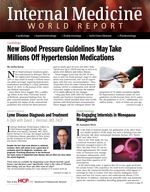Publication
Article
Internal Medicine World Report
High-Dose Multivitamins Do Not Reduce Cardiovascular Events After Heart Attack
Author(s):
A recent study found high-dose multivitamins and minerals taken after myocardial infarction do not significantly reduce subsequent cardiovascular events.

A recent study published in the Annals of Internal Medicine found high-dose multivitamins and minerals taken after myocardial infarction (MI) do not significantly reduce subsequent cardiovascular (CV) events.
Noting that the efficacy of high-dose multivitamin for secondary prevention of atherosclerotic disease remains unknown, Gervasio Lamas, MD, FACC, FAHA, FESC, of the Mount Sinai Medical Center Heart Institute in Miami Beach, FL, and fellow investigators from the Trial to Assess Chelation Therapy (TACT) assessed the potential CV benefits of an oral supplement randomly assigned to 1,708 men and women over age 50 who had a previous MI at least 6 weeks earlier. The study subjects also had serum creatinine levels of ≤2.0 mg/dL and took standard medications post-MI.
During the double-blind, multicenter trial, those who were randomized to the treatment group received daily pills containing a high-dose, 28-component multivitamin/mineral for a median of 31 months, while the placebo group received daily placebo pills for 35 months.
According to the authors, “645 (76%) and 646 (76%) patients in the vitamin and placebo groups, respectively, completed at least 1 year of oral therapy, and 400 (47%) and 426 (50%) patients, respectively, completed at least 3 years.” However, the researchers noted “many people in both groups stopped taking the pills, did not take the pills as often as they were instructed, or stopped participating in the study before it was planned to end.” In total, “394 (46%) and 390 (46%) patients in the vitamin and placebo groups, respectively, discontinued the vitamin regimen, and 17% of patients withdrew from the study.”
Nevertheless, the authors found the “occurrence of another heart attack, chest pain requiring hospitalization, the need for cardiac catheterization, stroke, or death did not significantly differ between the groups” after a median follow-up period of 55 months. Therefore, they concluded “high-dose oral multivitamins and multiminerals did not statistically significantly reduce CV events in patients after MI who received standard medications.”
In terms of safety measures, there was no evidence of harm from vitamin therapy in any category of adverse events. Even so, the researchers reinforced that “although high-dose multivitamins and minerals did not seem to be harmful, they did not seem to reduce heart attacks, stroke, or death after a previous heart attack.”
However, the authors acknowledged the considerable rates of nonadherence and withdrawals that occurred in the study “limit(ed) the ability to draw firm conclusions, particularly about safety.”
The study received grant support from the National Heart, Lung, and Blood Institute, as well as the National Center for Complementary and Alternative Medicine of the National Institutes of Health.






